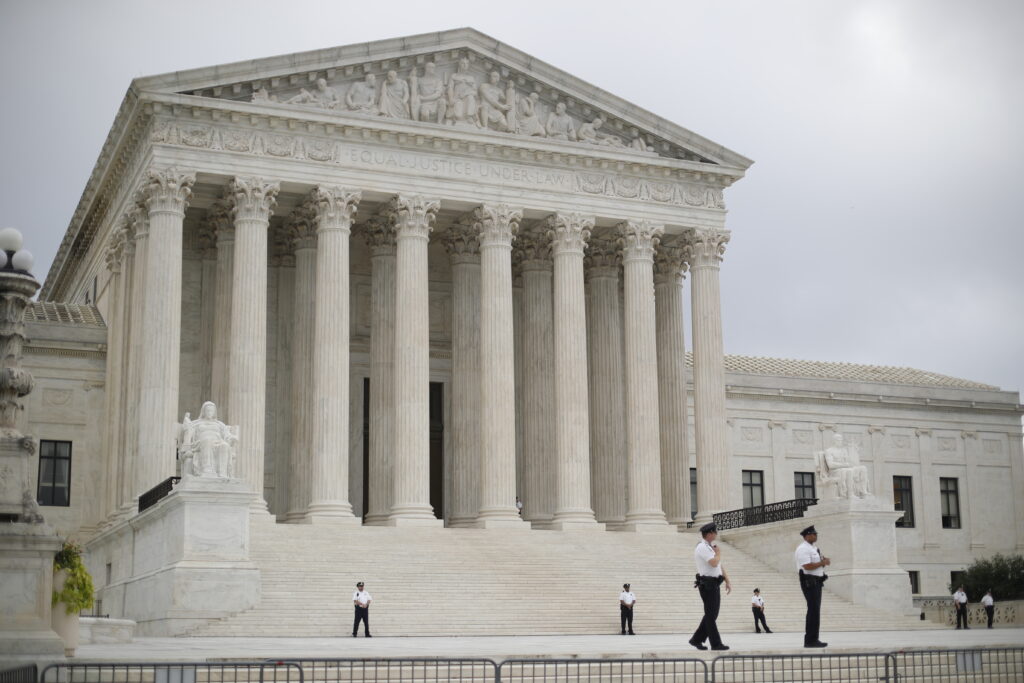It seems like common sense that pornographers such as PornHub should be required to ask for identification before selling pornography online. It is much the same as a strip club asking for identification before allowing people inside their premises. But 30 years of a faulty Supreme Court precedent has hitherto allowed online pornographers to get away with lower standards of security than must be met by pornographers in the real rather than virtual world. Fortunately, that is now likely to change thanks to the originalist majority of justices on the Supreme Court.
The court heard oral arguments Wednesday in Free Speech Coalition v. Paxton. The “Free Speech Coalition” is a coalition of pornographers including PornHub. Paxton is Texas Attorney General Ken Paxton.
Texas is one of 19 states that have recently passed laws requiring pornography sites to verify the age of their users before providing access. While some online pornographers have implemented such technology, others chose instead to close access to their websites in states that passed such laws and then pushed their trade association to challenge the constitutionality of those laws in federal court.
The Texas law and the other 18 state age-verification laws are not the first attempt to protect children from online pornography. The first law passed by Congress to regulate the internet, the Telecommunication Act of 1996, contained a provision that criminalized the knowing transmission of obscene content to minors.
Despite past cases that upheld government regulation of obscene material on radio and television, the Supreme Court held in Reno v. ACLU that regulation of speech on the internet deserved strict scrutiny because, as was naively thought back then, the internet “is not as invasive as radio or television.” “Communications over the Internet do not invade an individual’s home or appear on one’s computer screen unbidden,” the court reasoned. “Users seldom encounter content by accident.”
Considering how difficult it was for children to find obscene materials online and for speakers on the internet to determine the age of those who could access what they posted, the court held that the Telecommunication Act’s restrictions on obscene material unduly burdened the First Amendment and were, therefore, unconstitutional.
As conservative justices noted during oral arguments Wednesday, the internet has not only become far more “invasive” since 1996, but the technology to verify the ages of those granted access to a website has significantly improved as well.
“Technologically, access to pornography has exploded,” Chief Justice John Roberts observed in one of his early questions, with Justice Clarence Thomas later pressing President Joe Biden’s solicitor general, who was supporting the pornographers, “You would admit, though, that we’re in an entirely different world. Playboy was about squiggly lines on cable TV.”
The internet and the ubiquity of pornography have changed immensely since 1996. According to an amicus brief filed by the Institute for Family Studies, 90% of teenagers have been exposed to pornography online and 1 in 4 teenage boys now view pornography every day, a rate of use that is 10 times higher than just a decade ago. The pornography available today is far more violent and misogynistic than in the past, including regular depictions of choking, spitting, slapping, incest, and even rape.
Such hardcore material, which is now available on any cellphone 24 hours a day, seven days a week, does lasting damage to young people’s lives, including increased sexual aggression, decreased future relationship stability, and worse mental health problems.
The Democratic-appointed justices on the court seemed only concerned with the burdens that state laws would place on pornography users. “How far can a state go in terms of burdening adults?” Justice Ketanji Brown Jackson asked.
CLICK HERE TO READ MORE FROM THE WASHINGTON EXAMINER
Conservative justices on the court are likely to rule in favor of Texas. The only remaining question is how much of the damage done by online pornography they want to undo. They could simply hold that the age-verification requirements of the Texas law meet the strict scrutiny test used in Reno. Or the justices could acknowledge that the internet has become far more “invasive” since 1996, and the more reasonable “rational-basis” test should apply to all regulation of obscene material online.
“The tradition on the internet is to say that it will be free and that it is incumbent upon parents to screen out content that is inappropriate for their kids,” the pornographers’ lawyer said in his closing statement. But while appeals to “tradition” may normally work on conservative jurists, the internet itself is barely 40 years old, and its rules for managing pornography are even more recent. The Supreme Court has every right to reevaluate past rulings when technology changes, and in the case of pornography, the old rules are clearly not working.
